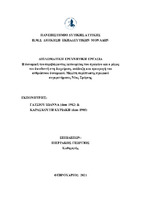| dc.contributor.advisor | Πιερράκος, Γεώργιος | |
| dc.contributor.author | Γάτσιου, Ιωάννα | |
| dc.contributor.author | Καρασκούτη, Κυριακή | |
| dc.date.accessioned | 2021-03-10T11:19:44Z | |
| dc.date.available | 2021-03-10T11:19:44Z | |
| dc.date.issued | 2021-02-25 | |
| dc.identifier.uri | https://polynoe.lib.uniwa.gr/xmlui/handle/11400/345 | |
| dc.identifier.uri | http://dx.doi.org/10.26265/polynoe-196 | |
| dc.description.abstract | Το σχολείο λειτουργεί ως ανοιχτό σύστημα που βρίσκεται σε αλληλεξάρτηση και αλληλεπίδραση με το εσωτερικό και εξωτερικό περιβάλλον. Κατά τη διαδικασία αυτή ο διευθυντής της σχολικής μονάδας καλείται να ανακαλύψει έναν κοινό τόπο οράματος και στόχων του σχολείου με τους συντελεστές επίτευξης( εκπαιδευτικούς, μαθητές, γονείς, τοπική κοινωνία, σύλλογοι, σχολικές επιτροπές).Σημαντική είναι όμως και η διαχείριση ,ανάδειξη, προαγωγή του ανθρώπινου δυναμικού και ο εκπαιδευτικός σχεδιασμός. Όλα όσα προαναφέρθηκαν αποτελούν σημαντικό άξονα ανάδειξης της αποτελεσματικότητας και της ποιότητας της σχολικής μονάδας. Η αποτελεσματική διαχείριση του ανθρώπινου δυναμικού είναι μια από τις σημαντικότερες προκλήσεις που αντιμετωπίζει ο διευθυντής για την απόκτηση και διατήρηση του ανταγωνιστικού πλεονεκτήματος του σχολείου του.
Η διοίκηση στην εκπαίδευση, παρέχει στους εκπαιδευτικούς-διοικητικούς ηγέτες τις δυνατότητες για ν΄ αφήσουν το στίγμα τους, προκειμένου να επιτύχουν , τόσο τους στόχους της εκάστοτε σχολικής μονάδας, όσο και να βελτιώνουν την απόδοση των ίδιων και των συναδέλφων τους. | el |
| dc.format.extent | 136 | el |
| dc.language.iso | el | el |
| dc.publisher | Πανεπιστήμιο Δυτικής Αττικής | el |
| dc.rights | Αναφορά Δημιουργού - Μη Εμπορική Χρήση - Παρόμοια Διανομή 4.0 Διεθνές | * |
| dc.rights.uri | https://creativecommons.org/licenses/by-nc-sa/4.0/deed.el | * |
| dc.subject | Σχολική κουλτούρα | el |
| dc.subject | Ανθρώπινοι πόροι | el |
| dc.subject | Διευθυντές σχολικών μονάδων | el |
| dc.subject | Ηγέτης | el |
| dc.subject | Διοίκηση ανθρωπίνων πόρων | el |
| dc.subject | Οργανωσιακή συμπεριφορά | el |
| dc.subject | Οργανωσιακή κουλτούρα | el |
| dc.subject | Ηγεσία | el |
| dc.subject | Σχολικό συγκρότημα | el |
| dc.title | Η δυναμική του περιβάλλοντος λειτουργίας του σχολείου και ο ρόλος του διευθυντή στη διαχείριση, ανάδειξη και προαγωγή του ανθρώπινου δυναμικού. Μελέτη περίπτωσης σχολικού συγκροτήματος Νέας Σμύρνης | el |
| dc.title.alternative | The dynamic of the school environment and the role of the headmaster in managing, bringing forward and promoting human resources. Case study of a Nea Smyrni school complex | el |
| dc.type | Μεταπτυχιακή διπλωματική εργασία | el |
| dc.contributor.committee | Spyridakos, Athanasios | |
| dc.contributor.committee | Psaromiligkos, Ioannis (Yannis) | |
| dc.contributor.faculty | Σχολή Διοικητικών, Οικονομικών & Κοινωνικών Επιστημών | el |
| dc.contributor.department | Τμήμα Διοίκησης Επιχειρήσεων | el |
| dc.contributor.master | Διοίκηση Εκπαιδευτικών Μονάδων | el |
| dc.description.abstracttranslated | Schools operate as open systems that continuously interact with and depend on the environment outside the school΄s walls. During this process, the headmaster of the school unit is called to discover a common ground of vision and purpose along with other contributing agents( educators, students, parents, local communities, parents΄ associations/societies, school committees).At the same time, the management, prominence and promotion of human resources is of vital importance, as well as educational planning. All of the above showcase and highlight the school unit΄s efficiency and quality. The successful management of human resources constitutes a major challenge for the headmaster, who needs to atta;in and also preserve the competitive edge of his/her school.
Administrative positions in the educational sector offer educators-educational leaders the chance to leave a mark in achieving the goals of their school while also improving the performance of themselves and their colleagues. The dissertation consists of two parts. The first part comprises the study΄s bibliographical context and the theoritical framework of the subject΄s defining parameters. It is developed in five chapers. The second part presents the empirical research conducted,developed in two chapters. | el |


